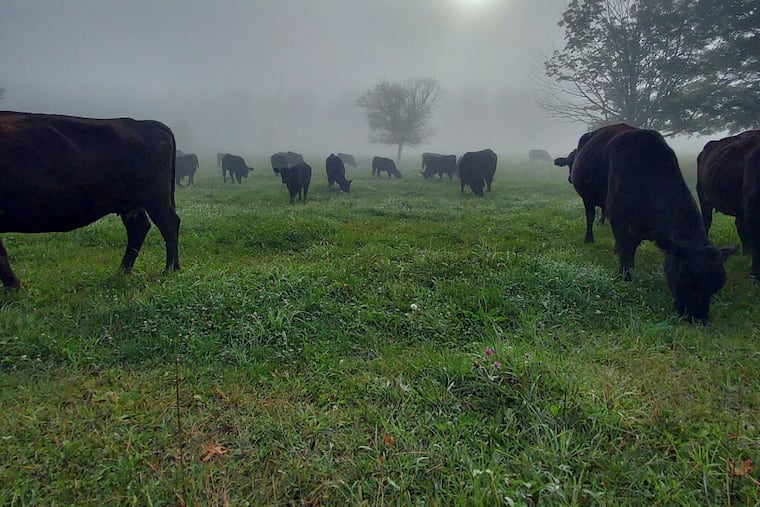At my farm, the creeks have run dry. We need a climate-smart Farm Bill.
We use climate-friendly techniques when we can, but those must be scaled up. Farmers want a Farm Bill that is mindful of the effects of agriculture on the planet.

In the 1990s, when I started working as a geologist, the alarm bells of climate change were already ringing loudly. Today, as I work my farm in Northwest Pennsylvania, the warnings are nearly deafening.
Climate change is already hindering my ability to farm. The four creeks running through my property in Sharpsville, Pa., ran dry this year for the first time in 15 years. After starting the season with a nearly 40-inch deficit of snow, we recorded the sixth driest year on record, and our hay and pasture production suffered as a result — grass needs rain to grow, after all. Our weather is harsher, our seasons are less predictable, and once-in-a-generation weather events — drought, flood, wildfire — are demonstrably more common than just a few decades ago.
At my farm — where we raise cows, pigs, turkeys, and chickens — we do what we can to mitigate our impact on the climate. That starts with nurturing soil while allowing our animals to live in the ways they’ve evolved to.
Instead of using a gas-guzzling Weedwhacker, we deploy a few goats, who happily eat weeds and trim grass. Instead of using harsh fertilizers, we send chickens to our hayfields, whose manure contains all of the 13 nutrients plants need for healthy growth.
Our pigs clear out our woodlots, allowing for new grass growth that feeds our 100% grass-fed cattle. (Managed poorly, pigs can be destructive of soil, which is one reason the majority are raised in confinement houses. But managed properly, and moved frequently, pigs are great soil-building tools.)
At the same time, I’m keenly aware that most American farms do not look or operate like mine. Industrial farming is a major cause of climate change; according to the U.S. Environmental Protection Agency, agriculture was responsible for more than 10% of U.S. greenhouse gas emissions in 2021.
Farmers need policy intervention to implement climate-saving practices on a much larger scale. Farmers need a climate-friendly Farm Bill.
The Farm Bill has been the cornerstone of U.S. agriculture policy for decades, providing subsidies to farmers to offset the cost and risks associated with growing food. It is renewed every five years. The current version of the Farm Bill expired in 2023.
We are long overdue for a bill that addresses sustainability and climate. We need lawmakers to listen to farmers who are already using climate-friendly, regenerative practices, who can testify that these tools are feasible, affordable, and effective.
As board president of the Pennsylvania Farmers Union, I have a front-row seat to the most pressing issues farmers face, the dire nature of our climate crisis, and the most effective, tangible solutions. Farmers want to see policies like the Cover Act, which rewards farmers for planting cover crops, which protects the soil from extreme weather events. Farmers want our lawmakers to subsidize nutritious food production, not excessive, soil-squandering monoculture.
Historically, the Farm Bill has primarily subsidized a handful of crops, such as corn and soybeans, which often leads to wasteful overproduction. Farmland is healthier and more resilient when it includes multiple crops and types of livestock, which work together to protect the soil while boosting production and resiliency. Soil is the one carbon sink on the planet over which humans have a modicum of control.
Farmers want a Farm Bill that considers sustainability and is mindful of the effects of agriculture on climate. We can no longer hold our breath for a break in the rain or the drought or whatever climate-driven crisis is plaguing our land and hope that our farmers can adapt.
The Inflation Reduction Act of 2022 appropriated more than $18 billion in new funding specifically for climate-smart agriculture. These funds are intended to mitigate greenhouse gas, incentivize sustainable farming techniques, and protect farms like mine from hostile climate events. This is a good start. But the funding expires in 2031; to actively address our very present climate crisis, this funding must be protected in the next Farm Bill.
Ultimately, Congress has a simple choice to make: a Farm Bill that ignores the most grave threat to American farmers, and our nation’s ability to feed itself, or a Farm Bill that attempts to fix our very present climate crisis.
It may be months before a Farm Bill is passed. Until then, Congress must push for a climate-smart bill. My farm depends on it, our future depends on it, and American eaters depend on it.
Michael Kovach is the board president of the Pennsylvania Farmers Union and on the steering committee of Regenerate America. He is the owner of Walnut Hill Farm in Mercer County, Pa. mkovach@pafarmersunion.org